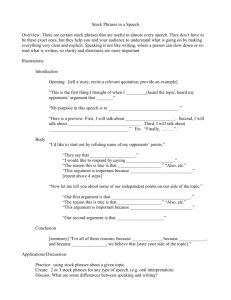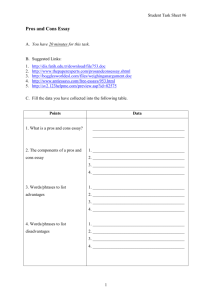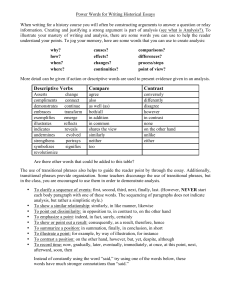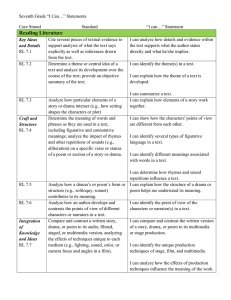15 Commandments of College-level Essay Writing
advertisement
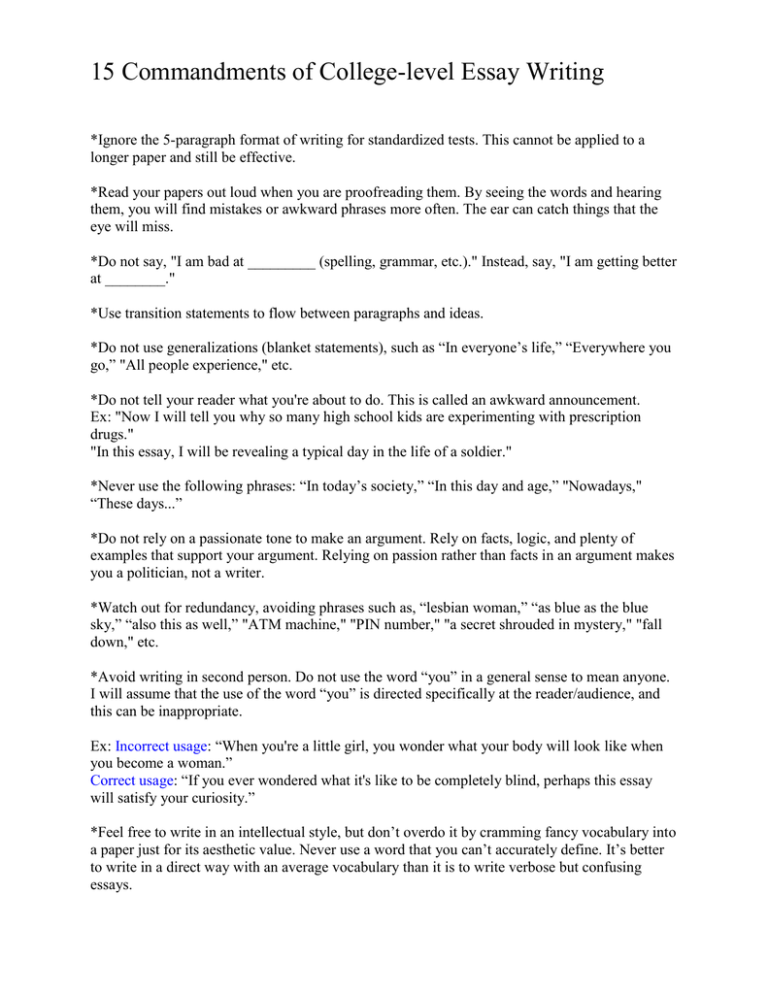
15 Commandments of College-level Essay Writing *Ignore the 5-paragraph format of writing for standardized tests. This cannot be applied to a longer paper and still be effective. *Read your papers out loud when you are proofreading them. By seeing the words and hearing them, you will find mistakes or awkward phrases more often. The ear can catch things that the eye will miss. *Do not say, "I am bad at _________ (spelling, grammar, etc.)." Instead, say, "I am getting better at ________." *Use transition statements to flow between paragraphs and ideas. *Do not use generalizations (blanket statements), such as “In everyone’s life,” “Everywhere you go,” "All people experience," etc. *Do not tell your reader what you're about to do. This is called an awkward announcement. Ex: "Now I will tell you why so many high school kids are experimenting with prescription drugs." "In this essay, I will be revealing a typical day in the life of a soldier." *Never use the following phrases: “In today’s society,” “In this day and age,” "Nowadays," “These days...” *Do not rely on a passionate tone to make an argument. Rely on facts, logic, and plenty of examples that support your argument. Relying on passion rather than facts in an argument makes you a politician, not a writer. *Watch out for redundancy, avoiding phrases such as, “lesbian woman,” “as blue as the blue sky,” “also this as well,” "ATM machine," "PIN number," "a secret shrouded in mystery," "fall down," etc. *Avoid writing in second person. Do not use the word “you” in a general sense to mean anyone. I will assume that the use of the word “you” is directed specifically at the reader/audience, and this can be inappropriate. Ex: Incorrect usage: “When you're a little girl, you wonder what your body will look like when you become a woman.” Correct usage: “If you ever wondered what it's like to be completely blind, perhaps this essay will satisfy your curiosity.” *Feel free to write in an intellectual style, but don’t overdo it by cramming fancy vocabulary into a paper just for its aesthetic value. Never use a word that you can’t accurately define. It’s better to write in a direct way with an average vocabulary than it is to write verbose but confusing essays. *Do not write the nonspecific term, “society.” You will define exactly which society, culture, or subculture you are discussing, i.e., Americans, young Americans, young Asian Americans, citizens of Washington state, people who live in Seattle, etc. *Do not to ask more questions than are answered in a paper. Space questions throughout rather than writing them in a row. Ex: A poor intro or second paragraph would look like this: “Where do these ideas come from? Who decides what is accurate and what is a stereotype? When will society learn that every individual is different?” *Do not begin a sentence with the following words or phrases: “Well,” “So,” “Anyway,” “I mean,” etc. *Do not begin a conclusion paragraph with typical phrases such as, “All in all,” “In summary,” "As you can see," etc. Euphemism- a polite word used to replace a controversial or offensive concept Rhetorical question- a question that makes a point, rather than requiring or expecting an answer


